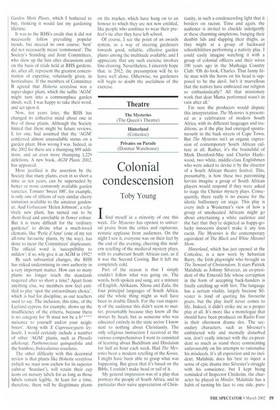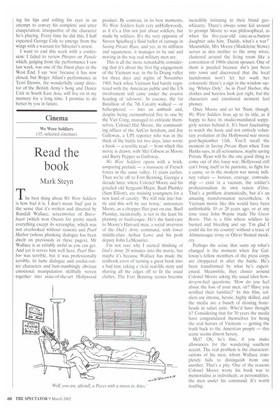Colonial condescension
Toby Young
Ifind myself in a minority of one this week, The Mysteries has opened to universal praise from the critics and rapturous, ecstatic applause from audiences. On the night I saw it, everyone was on their feet by the end of the evening, cheering this modern retelling of the medieval mystery plays, with its exuberant South African cast, as if it was the Second Coming. But it left me completely cold.
Part of the reason is that I simply couldn't follow what was going on. The words, both spoken and sung, are a mixture of English, Afrikaans, Xhosa and Zulu, the four principal languages of South Africa, and the whole thing might as well have been in double Dutch. For the vast majority of the audience this didn't seem to matter, presumably because they know all the stories by heart, but as someone who was educated entirely in the state sector I know next to nothing about Christianity. The only religious instruction I received at the various comprehensives I went to consisted of learning about Buddhism and Hinduism for half an hour each week. Had The Mysteries been a modern retelling of the Koran, I might have been able to grasp what was happening. But given that it's based on the Bible, [couldn't make head or tail of it.
My general impression was of a play that portrays the people of South Africa, and in particular their naive appreciation of Chris
tianity, in such a condescending light that it borders on racism. Time and again, the audience is invited to chuckle indulgently at these charming simpletons, banging their dustbin lids and slapping their thighs, as they might at a group of backward schoolchildren performing a nativity play. I could easily imagine watching it with a group of colonial officers and their wives 100 years ago in the Muthaiga Country Club: 'Oh do look, Charles. That funny little man with the horns on his head is supposed to be the devil, Isn't it marvellous that the natives have embraced our religion so enthusiastically? All that missionary work that dear Mama performed wasn't in vain after all.'
I'm sure the producers would dispute this interpretation, The Mysteries is presented as a celebration of modern South Africa, with its different languages and traditions, as if the play had emerged spontaneously in the back streets of Cape Town. But The Mysteries isn't an organic expression of contemporary South African culture at all. Rather, it's the brainchild of Mark Dornford-May and Charles Hazlewood, two white, middle-class Englishmen who were asked to devise it by the director of a South African theatre festival. This, presumably, is how these two patronising luvvies imagine a group of South African players would respond if they were asked to stage the Chester mystery plays. Consequently, there really is no excuse for the idiotic buffoonery on stage. This play is every inch a Westerner's view of how a group of uneducated Africans might go about entertaining a white audience and the fact that they're depicted as happy-golucky innocents doesn't make it any less racist. The Mysteries is the contemporary equivalent of The Black and White Minstrel Show.
Hinterland, which has just opened at the Cottesloe, is a new work by Sebastian Barry, the Irish playwright who brought us The Steward of Christendom. It stars Patrick Malahide as Johnny Silvester, an ex-president of the Emerald Isle whose corruption in the form of accepting back-handers is finally catching up with him. The language has a certain vitality, largely because Silvester is fond of quoting his favourite poets, but the play itself never comes to life. Indeed, it didn't strike me as a proper play at all. It's more like a monologue that should have been produced on Radio Four in their afternoon drama slot. The secondary characters, such as Silvester's embittered wife and mentally disturbed son, don't really interact with the ex-president so much as stand there commenting unfavourably on his attempts to rationalise his misdeeds. It's all exposition and no incident. Malahide does his best to inject a sense of epic drama into Silvester's struggle with his conscience. but I kept being reminded of Inspector Chisholm, the character he played in Minder. Malahide has a habit of turning his face to one side, purs ing his lips and rolling his eyes in an attempt to convey his complete and utter exasperation, irrespective of the character he's playing. Every time he did this, I half expected George Cole to emerge from the wings with a warrant for Silvester's arrest.
I want to end this week with a confession: I failed to review Privates on Parade which, judging from the performance I saw last week, was one of the finest plays in the West End. I say 'was' because it has now closed, but Roger Allam's performance as Terri Dennis, the wonderfully camp director of the British Army's Song and Dance Unit in South East Asia, will live on in my memory for a long time. I promise to do better by you in future.















































































 Previous page
Previous page